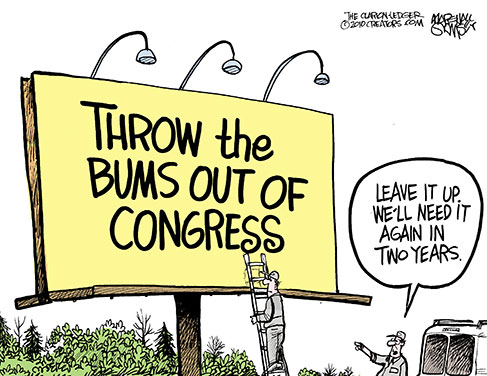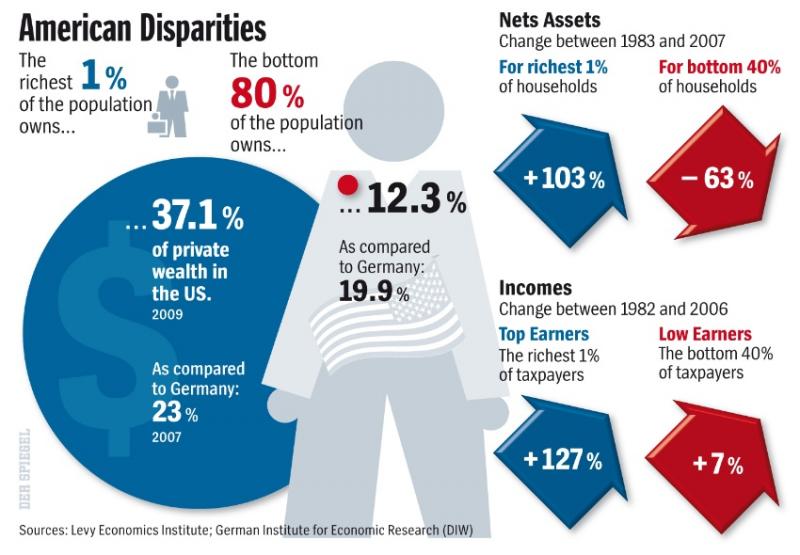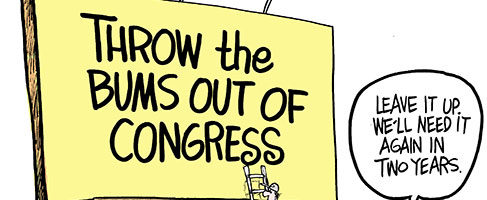 After 240 years of living under a republic, is America more prepared to participate in an actual democracy?
After 240 years of living under a republic, is America more prepared to participate in an actual democracy?
In 1776, a republic was a far cry better than a kingdom, yet the founding fathers agreed that a true democracy would be too unruly. When the 91 members of Congress, representing the populace of roughly 3 million people, was .003% of the population, they made the best decision they could with the technologies at their disposal to create a government of, by, and for the people. However, although our republican government does utilize a democratic activity every 2 years, a republic is not the same thing as a democracy.
With our current congressional membership at 535 members, it does not appear that this .0001% of the almost 314 million Americans they make decisions for are doing a very good job of creating a sustainable and resilient way of life for their constituents. Whereas the 1st members of Congress each represented around 33,000 people, the members of 112th Congress spoke for roughly half a million people each, as does the 114th Congress. It seems to me that one would have to be near superhuman to have that kind of accountability, in order to truly speak for such a huge number of people. And I might be a little more forgiving of the people who dared to do so if I felt that they were actually representatives of the people, yet the former occupations and limited thinking which accompany them do not adequately represent the constituency.
The 1st Congress consisted of 91 members, 34 of which were lawyers, 15 soldiers, and the rest a nice cross section of 12 farmers, 11 merchants, 6 clergymen, 5 career politicians, 4 physicians, 3 teachers, and 1 diplomat. In contrast, the 112th Congress consisted of 539 members, including 209 merchants, 208 career politicians, 200 lawyers, 81 educators, 34 agricultural professionals, 32 medical professionals, 17 journalists, 9 accountants, 9 scientists, 9 social workers, 9 military reserves, 7 law enforcement officers, 5 ministers, 4 pilots, 4 peace corps volunteers, 2 professional football players, 2 screenwriters, a firefighter, an astronaut, a documentary filmmaker, and a comedian. Of course, the number of occupational possibilities has increased dramatically over the years, yet the core has not changed all that much.
In the 1st Congress, lawyers comprised 37% of the seats with businessmen and merchants filling 12%. In 2012, lawyers still filled 37% of the seats, but merchants sat in 39%. And as law has become good business in this system, career politicians have risen from .05% of the congressional seats to 39%, standing shoulder to shoulder with the merchants, as they have developed a system run largely on criminalism and finance.
Granted, across the board, the 112th US Congress had a pretty good representation of assorted occupations, however, beyond the merchants, career politicians, and lawyers, the “regular folk” only constitute 42%, which is, coincidentally, just a bit shy of the percentage of Americans that actually vote. So perhaps in that regard, the Congress is representative of the people. Beyond that, it appears that the Congress is just about making laws for their own sake, making money, and throwing parties.
I get that a government’s purpose is to make laws, but in a country that boasts of freedom, our government ought to be about organizing and protecting our assets and resources so as to provide the highest good to the greatest number instead of inhibiting the rights of life, liberty, and the pursuit of happiness through the manufacturing of criminals and promotion of servitude and scarcity. Is it truly representative of the people to have 37% of its representation filled by lawyers, an occupation that is only actually .38% of the population? In a free country, the government should make as few laws as possible and not be comprised of people that are beholden to make them.
 Beyond occupationally, the current US Congress is mis-representative of the US people in that its median net worth for its members is just over a million dollars, which makes the people of the United States, a population with only 3% millionaires, subordinate to an organization comprised of 50% millionaires. Of course, even as supposed public servants, the base salary for members of Congress, at 174,000$ a year (plus benefits) is over 3 times the size of the median household income of 51,939$, which means that Americans are paying millionaires and lawyers more than they actually make in order for them to continue making decisions which do not actually work in the best interest of the people. Due to this lop-sided representation that some have called oligarchy, the US Congress operates very much like the Kingdom of George we declared independence from all those year ago, with a small band of rulers replacing a single lord, and holding dear to the obliviousness toward the needs of the common man.
Beyond occupationally, the current US Congress is mis-representative of the US people in that its median net worth for its members is just over a million dollars, which makes the people of the United States, a population with only 3% millionaires, subordinate to an organization comprised of 50% millionaires. Of course, even as supposed public servants, the base salary for members of Congress, at 174,000$ a year (plus benefits) is over 3 times the size of the median household income of 51,939$, which means that Americans are paying millionaires and lawyers more than they actually make in order for them to continue making decisions which do not actually work in the best interest of the people. Due to this lop-sided representation that some have called oligarchy, the US Congress operates very much like the Kingdom of George we declared independence from all those year ago, with a small band of rulers replacing a single lord, and holding dear to the obliviousness toward the needs of the common man.
Considering the restraints of 1776, a republic was an astounding step forward, but given the technological achievements which have been used to empower the common man since, for the first time in history, we have the capacity to attempt an actual working democracy and not be so reliant upon mis-representatives. However, it may not necessarily be done by changing it from the top down, but from the bottom up. Should we direct our energies toward the changes that we can make locally first, investing in renewable power, a more plentiful food-shed, and a more resilient local economy, we have a much greater chance of creating a community of abundance than if we use our energy to feed the gluttonous appetite of imperial power.
Can America become a democracy or is our hierarchy of power truly necessary?


Corporations didn’t even exist in 1776. Now corporations buy and sell all of the congressman, thanks to “citizensUnited”…